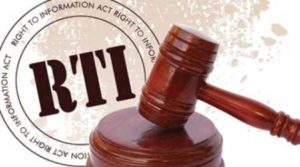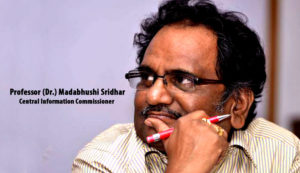Right of the Electors to Question the Elected – Sri Madabhushi Sridhar, Hon’ble Central Information Commissioner of India
A voter Vishnu Dev Bhandari asked for the progress of the works undertaken in Khatauna block of Madhubani District, Bihar, and under RTI he was asking for action taken a report. The CPIO and First Appellate Authority did not bother to respond. If not the voter, who would ask the representative or agency that executes the works for which representative has allocated funds? If a voter sought information about his representative in Parliament regarding the progress of works initiated under his MPLADs, it has to be appreciated as proper use of RTI. The voter-appellant wanted to know the progress/status of developments in the Parliamentary constituency of Madhubani under Member of Parliament Local Area Development Scheme (MPLADS) in Khatauna block of Madhubani district, Bihar. A voter has every right under the RTI to know about the selection of works, progress, incomplete works, the delay, reasons thereof and possible time of their completion.
 It is from the tax payer’s money, that each parliamentarian is getting Rs 5 Crore per annum, besides all his primary and VVIP standard facilities were taken care of. Each Member of Parliament is privileged to allocate from his Rs 5 crore annual fund for the developmental activities in his constituency which is called “Members of Parliament Local Area Development Scheme (MPLADS)”.
It is from the tax payer’s money, that each parliamentarian is getting Rs 5 Crore per annum, besides all his primary and VVIP standard facilities were taken care of. Each Member of Parliament is privileged to allocate from his Rs 5 crore annual fund for the developmental activities in his constituency which is called “Members of Parliament Local Area Development Scheme (MPLADS)”.
The actual progress on the field could be ascertained by the local authorities like District Magistrate and his subordinates. Regarding how the works were chosen, the officers said that it was totally in the discretion of the concerned MP and no authority could intervene in it. This information is partly held by the respondent Ministry, District Collectors/Magistrates in the Constituency, the MP, his legislature party and the political party, if they have any guidelines or policy regarding allocation of funds for the works in the constituencies. All of these authorities have a duty to answer to the voter-citizen. There is no doubt that the Ministry and the District Collectors are public authorities under the RTI Act and they are supposed to answer the appellant within 30 days.
Voter’s request for information is not motivated by any personal interest, and he was not asking any personal information or private information about the MP. He is not even asking about their assets, or increase during the term or the money he spent to get elected etc. He was also not raising any political issue. The information sought does not fall under any category of exceptions prescribed under RTI Act. In fact it was the duty of the Ministry, which is called “Statistics and Programme Implementation” that means it is supposed to have information and also supervise the implementation of the programs. The question, questioner and also questioned authority were proper and legal.
Though officers or District Magistrates/Collectors of concerned districts can provide statistical data as available, the real questions regarding criterion etc of the MP’s decision to allot funds for some works and refusing others remain unanswered, which could be answered either by MP or his legislature party or its original political party.
The Commission directed the CPIO of Ministry of Statistics & Programme Implementation, and CPIO of Lok Sabha Secretariat to provide a report on activities on MPLADS in Khatauna block of Madhubani constituency along with details sought by the appellant, besides placing it in their official website, before 7th September 2017.
The Commission directed the CPIO and Mr. S.K. Surwade, Director and HOD, who is considered as deemed CPIO to show cause why the penalty should not be imposed against each of them for not responding, which amounts to deemed refusal under Section 7(2) and will attract Section 20 of the RTI Act. The First Appellate Authority is also directed to explain why disciplinary action should not be recommended against him for not taking up the first appeal at all, which amounts to an abdication of responsibility under RTI Act.
The Commission directed the PIO/PA or PS of the concerned MP, Honorable Shri Hukumdev Narayan Yadav to furnish the details of the works recommended by him, the criterion of selection or rejection and progress of the work etc. The last date for responses was 7th September 2017.
Considering the possibility of policy or guidelines being issued by the Parliamentary Party of the BJP, in which the concerned MP is the member, invites the views/contentions of the Government Chief Whip, the Leader, and Deputy Leader (LS) of BJP, or any other authorized representative as to why the BJP Parliamentary Party should not be declared as ‘public authority’ under 2(h) of RTI Act, 2005.
As the BJP Parliamentary Party is the ruling party of the Government of India, proclaimed its commitment to transparency and clean government, the Commission recommends to voluntarily disclose the criterion for selection of works under MPLADs along with Constitution wise works list and their progress with regular updating, on their official website/websites of the party or Legislature Party or individual MPs, if they have any, to fulfil their democratic obligation to inform the voters of India, within reasonable time.
In principle, every legislature/parliamentary party shall be considered as public authority. Either because of RTI Act, or because of their Constitutional obligation to give good governance or because of their oath under the Constitution, every legislator and their group called “Legislature/Parliamentary Party” or their “Original Political Party” as defined under the Constitution (Tenth Schedule), have moral, legal and constitutional obligation to disclose at least the MPLADs related information on their own under Section 4(1). The Commission recommends every legislator to fulfill this obligation as they have promised this nation to work as per the Constitution. The Commission would like to remind the elected legislators the oath they have taken while assuming the office of members of the legislature. The MPs and if one of the MPs is the Minister, are under obligation to take following oath as per the Third Schedule of our Constitution:
Form of oath of office for a Minister for the Union:-
“I, [the name], do swear in the name of God/solemnly affirm that I will bear true faith and allegiance to the Constitution of India as by law established, [that I will uphold the sovereignty and integrity of India,] that I will faithfully and conscientiously discharge my duties as a Minister for the Union and that I will do right to all manner of people in accordance with the Constitution and the law, without fear or favour, affection or ill-will.”
Form of oath of secrecy for a Minister for the Union:-
“I, [the name], do swear in the name of God/solemnly affirm that I will not directly or indirectly communicate or reveal to any person or persons any matter which shall be brought under my consideration or shall become known to me as a Minister for the Union except as may be required for the due discharge of my duties as such Minister.”
The Ministers who took the oath of secrecy, need not be reminded that they have a duty to reveal that information that may be required for the due discharge of their duties as a minister. This means the information like the progress of works under MPLADs scheme shall be disclosed as that would be required in the due discharge of the duties. The MPs, MLAs, and MLCs will not take the oath of secrecy, and hence bound to give all information, including that was asked by the appellant in this case. They have to uphold the integrity of India, which cannot be done without the integrity of individual members of the legislature, and if the anti-corruption measures including transparency are not ensured. All of them have the duty to faithfully discharge their duties under the Officer they entered upon.
Apart from political parties in centre and states, the Commission also invites civil society including NGOs and individual citizens having concern for democracy and transparency to express their opinion/contentions or views on the issue of bringing legislature parties/parliamentary parties under the purview of Right to Information Act, 2005 to provide people access to information, by email to madabhushisridhar@gov.in before 8th September, 2017. (Based on decision in CIC/MOSPI/A/2017/176195 in Vishnu Dev Bhandari v. PIO, M/o Statistics & Programme Implementation on 18.8.2017)
About the Author:
 Professor (Dr.) Madabhushanam Sridhar Acharyulu (known with pen name Madabhushi Sridhar) is an Author of 30 books on Law & Journalism both in English and Telugu languages. He was a professor of law at National Academy of Legal Studies and Research (NALSAR) the University of Law at Hyderabad till 20th November 2013 which he resigned to take up the position of Central Information Commissioner at New Delhi on 22nd November 2013.
Professor (Dr.) Madabhushanam Sridhar Acharyulu (known with pen name Madabhushi Sridhar) is an Author of 30 books on Law & Journalism both in English and Telugu languages. He was a professor of law at National Academy of Legal Studies and Research (NALSAR) the University of Law at Hyderabad till 20th November 2013 which he resigned to take up the position of Central Information Commissioner at New Delhi on 22nd November 2013.
A double post graduate with LL.M., and M.C.J (Journalism) from Osmania University, Madabhushi achieved FIVE Gold Medals in all. Madabhushi has penned more than 100 research articles, developed lessons in Media Law and Journalism, presented papers at International and National Seminars on subjects of socio-legal importance and a columnist both in English and Vernacular Telugu on socio-legal issues in Daily Newspapers and the web journals. He wrote edit page articles in Eenadu, the Largest Circulated Telugu Daily and Property Law matters in Deccan Chronicle, Indian Express, The Hindu and The Hans India, Hyderabad. Besides, he also designed and presented various legal awareness programs on popular tv channels like ETV and HMTV. His BhoomiKosam(=For Land) program on HMTV has spread awareness about land rights in AP. He wrote several articles on media and law in www.thehoot.org and indiacurrentaffairs.org websites.
Detailed Biography here




Leave a Reply